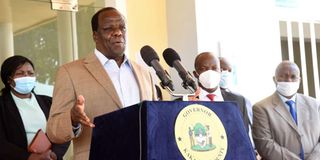Another doctors’ strike looms as governors disown pay deal

Council of Governors Chairman Wycliffe Oparanya addresses journalists at Kakamega County headquarters on December 30, 2020.
What you need to know:
- Health workers have vowed to stage another strike in what is likely to yet again cripple health services across the country.
- The move by the governors is also likely to put them on a collision course with President Uhuru Kenyatta.
The country is staring at another health-sector paralysis after governors disowned a return-to-work formula the government signed with doctors and clinical officers.
The county bosses yesterday said the perks agreed on in the return-to-work formula are unaffordable and that they were never consulted before the figures were arrived at.
But the health workers reacted sharply to the governors’ move, vowing to head back to the streets in what is likely to cripple health services across the country, again.
At a press briefing, the Kenya Union of Clinical Officers (Kuco) Chairman Peterson Wachira gave the governors 48 hours to sign the formula arrived at with a multi-agency team led by Labour Cabinet Secretary Simon Chelugui, failure to which their earlier strike will resume.
CoG put on notice
“We are putting the Council of Governors (CoG) on notice. If the return-to-work formula is not going to hold, then that means the strike resumes,” he said, clarifying that the formula was the main reason they had called off their strike.
The move by the governors is also likely to put them on a collision course with President Uhuru Kenyatta, who intervened to end the medics’ strike, which had paralysed healthcare across the country.
“We really want to know why they would go against the Head of State and object to what he gave us to end the strike. This is insubordination and intimidation. If we are not given what we signed for, then we are going back to the streets,” said Kuco Secretary-General George Gibore.
It is not clear why the governors have changed their stand on the issue yet they were party to the negotiations and even appended their signatures on the medics’ return-to-work formula.
Those who were present and appended their signatures to the agreement include Health Cabinet Secretary Mutahi Kagwe, CoG Chairman Wycliffe Oparanya, CoG Labour Committee Chairman James Ongwae, the Kenya Medical Practitioners, Pharmacists and Dentists Union (KMPDU) Secretary-General Chibanzi Mwachonda and KPMDU Chairman Samwel Oroko. The signing was witnessed by Mr Chelugui.
Under the return-to-work formula, the doctors and clinical officers’ risk allowance was increased by 500 per cent.
Health workers’ grievances
With the majority of the health workers’ grievances addressed, they called off the strike.
Mr Mwachonda and Mr Gibore said the agreements were given a clean bill of health by President Kenyatta. Nurses, who form the bulk of critical medical workforce, are however, still on strike with no deal yet on the table.
Mr Oparanya said some issues raised in the return-to-work formulas have huge monetary implications that have neither been factored in the current budget nor the forthcoming financial year.
The CoG chairman said each county would therefore require a special conditional grant to implement the deal with the doctors and clinical officers.
“Risk allowance increment of between 500 per cent and 650 per cent to only two cadres would have a ripple effect on other cadres in the health sector and also requires the Salaries and Remuneration Commission’s (SRC) approval and availability of resources for sustainability,” said Mr Oparanya.
Job contracts conversion
He further said conversion of job contracts to permanent and pensionable terms would also require vast resources that have not been factored in the current counties’ budget.
“With the enhanced comprehensive group life cover, we need resources to cover families for a period of eight years. We need time to work out the actual figures. As for NHIF, it will not work in all the counties since some have moved due to poor services. The monopolisation and centralisation of insurance services is not tenable as counties have taken different insurance schemes for their workers,” Mr Oparanya said.
He noted that each county government is an employer on its own and, therefore, there should be a separate return-to-work formula for each devolved unit.
“Counties have already taken remedial measures in relation to the strike, which cannot be vacated and thus a centralised return-to-work formula cannot be undertaken at this point,” he said.
Mr Wachira, however, faulted Mr Oparanya’s demand that clinical officers should sign separate return-to-work formulae with their respective counties, saying they had already agreed with the CoG during the conciliatory meetings that their issues would be addressed centrally.
The sentiments were echoed by Mr Gibore, who accused the governors of mishandling the health sector, which has seen more than 103 strikes since the advent of devolution in 2013.






